EWOSA News - November 2021

- Home
- EWOSA News - November 2021
Welcome to the latest edition of the Energy and Water Ombudsman SA (EWOSA) quarterly newsletter: your one stop shop for emerging consumer trends, hot issues and policy matters.
From the Ombudsman
One important action was the cessation of electricity disconnections for non-payment of bills. Disconnection cases related to credit management issues, including non-payment of bills, dropped by 69%. We have seen greatly reduced numbers of credit management cases since March 2020, indicating a low occurrence of cases related to financial hardship and disconnections.
The Annual Report suggests the impact of COVID-19 was more pronounced at the start of the pandemic. Normally the lowest case numbers each financial year are recorded in December, but in 2019-20 there was a significant decline from March onwards, which aligned with the start of the economic disruption.
In 2020-21, however, things were closer to the normal pattern, with the exception of a 13-year low in April 2021, which can most likely be attributed – at least in part – to the very mild summer and subsequent reduced energy use.
As in previous years, and in common with experiences interstate, the highest number of cases referred to EWOSA related to billing issues. Of all cases handled during the year, 80% were related to electricity supply, followed by gas (14%) and water (6%).
Around 86% were resolved within 30 days, and 96% within 60 days. Independent research suggests a customer satisfaction rate of 96% in relation to EWOSA’s performance.
As always, we are here to help. Please contact us on 1800 665 565 or via our website if you need assistance.
Sandy Canale
Energy and Water Ombudsman SA
Consumer Trends 1


Hot Topics
Mr David Swift was appointed Chair of the Essential Services Commission (of South Australia) for a five-year term, effective 1 October 2021.
In its announcement, the Commission noted that Mr Swift’s “insight, intellect and collegiate approach will hold the Commission in good stead as we continue our work to protect South Australian consumers”.
Mr Swift said he was confident that the organisation was well placed to deliver benefits to the South Australian community:
“The responsibilities of the Commission are broadening and the services we regulate are changing. In this context, the Commission is committed to ensuring that consumers of regulated services are adequately protected and that, where we provide advice to Government, that advice provides an accurate and well-considered evidence base for policy making. I and the other Commissioners look forward to working closely with stakeholders going forward.”
Source
The Australian Energy Market Commission (AEMC) has committed to contributing to a decarbonising, affordable and reliable energy system.
In its new Strategic Plan 2021-22 to 2024-25, the AEMC says it will deliver effective outcomes for consumers through practical rule changes and expert advice. It wants to be more forward thinking in actions and decisions and to continuously adapt the way it engages and collaborates with stakeholders.
Priority areas for action are:
• a new decision-making framework
• a prioritisation framework
• better engagement and collaboration with stakeholders
• brevity
• forward thinking
• effective collaboration with market bodies
• continuing to invest in our people.
Source
The Australian Energy Regulator (AER) has outlined what good consumer engagement should look like in a move aimed at ensuring energy networks provide business proposals that are consumer centric.
In its draft Better Resets Handbook, it is proposing to establish a new “targeted review stream” that would allow network businesses to receive earlier guidance from the AER on their proposal.
The AER has said: “The draft Better Resets Handbook proposes changes in the way the process is undertaken, placing greater emphasis on high quality consumer engagement and offering more clarity on what the AER considers would be in a proposal that is capable of acceptance.”
Source
Consumer Trends 2
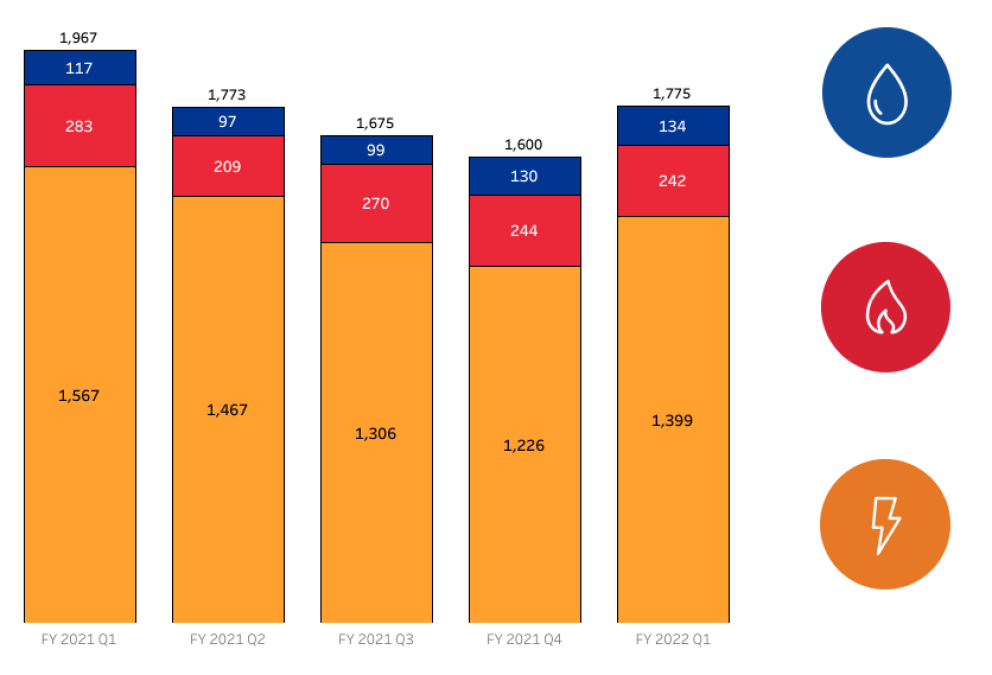

Case Studies
Issues: Billing – Back bill
Utility: Water
Customer type: Residential
Case type: Investigation
The issue:
Mr D complained that his supplier back billed for water use beyond the period that could be recovered. He disputed the bill from September to December 2020, which he believed included all the water use recorded on the meter from March 2019 when the meter was installed.
Our review:
We found that the supplier:
• installed the water meter in March 2019
• did not obtain actual quarterly meter reads from June 2019 to September 2020
• obtained an actual meter read in December 2020
• issued a bill from September to December 2020 based on the use recorded from the March 2019 meter installation to December 2020, which was not permitted according to undercharging rules.
Resolution:
The supplier applied a $60 credit to Mr D’s account for the water use before May 2020 that the supplier was not permitted to recover.
The supplier also applied a $50 credit to Mr D’s account for the overcharging of water use billed at a higher tiered rate from September to December 2020.
Issues: Credit Management – Credit Action Taken in Error – Default Listed in Error
Utility: Gas
Customer Type: Residential
Case Type: Investigation
The issue:
Ms M complained about a default listing on her credit file for a finalised gas account at a previous address. She said she had contacted her supplier to finalise her account and provide a forwarding mailing address, but had received no further correspondence.
Ms M paid the account after she became aware of the default but was dissatisfied when her supplier advised her that the default was valid and would not be removed.
Our review:
We found that Ms M’s supplier correctly listed the default.
We reviewed the process the supplier undertook before listing the default and found no error or grounds to remove the default.
We found that Ms M’s gas account was finalised in June 2019 after a new customer opened a gas account. We also found no evidence that Ms M contacted her supplier to finalise her account and provide a forwarding mailing address.
Resolution:
The supplier had already updated the default to paid and no further resolution offer was made.
Consumer Trends 3
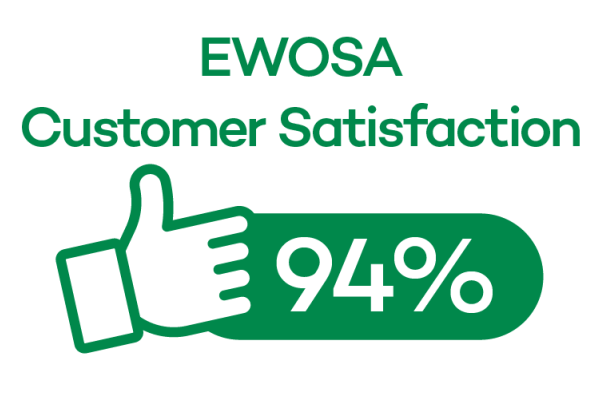
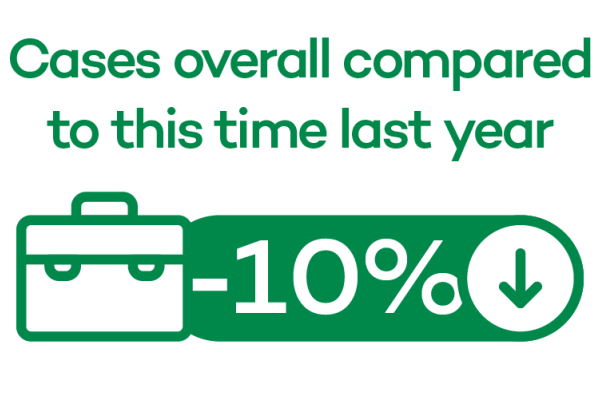
Customer Corner
Customers can now switch energy retailers in two days, regardless of their meter type.
Changes made by the Australian Energy Market Commission in 2019 have commenced. They remove outdated requirements in the customer transfer process and change the standard contract terms and conditions to allow all types of customer transfer.
The provisions do not prohibit customers from transferring on a suite of meter read options. This means estimated reads such as customer self reads are allowed.
More information
Before asking to move to a smart meter, customers need to be aware that they may be transferred to a cost reflective tariff as part of this change.
These tariffs have been designed by SA Power Networks (SAPN), which made the following statement.
“From July 2020, new residential Time-of-Use tariffs were introduced for residential customers with smart meters. These tariffs encourage more consumption of electricity during the middle of the day, to take better advantage of surplus solar generation. This ‘solar sponge’ tariff is offered between 10am to 3pm and is a quarter of the price of the normal network tariff.
“By encouraging more energy use in the middle of the day, we can facilitate more solar rooftop exports and increase the amount of low-cost renewable energy available in South Australia.”
Source
The Department of Energy and Mining offers a free and independent energy advisory service which covers a range of topics.
You can learn tips on how to save energy at home as well as find links to other services to help you pay bills. A range of other services also is offered.
The service is available by phone or email between 9am and 5pm, Monday to Friday.
Phone: 8204 1888 or 1800 671 907 (free call from fixed lines).
Email: energyadvice@sa.gov.au.
A website with helpful information is also available.
Source
Public Submissions
Consumer Trends 4
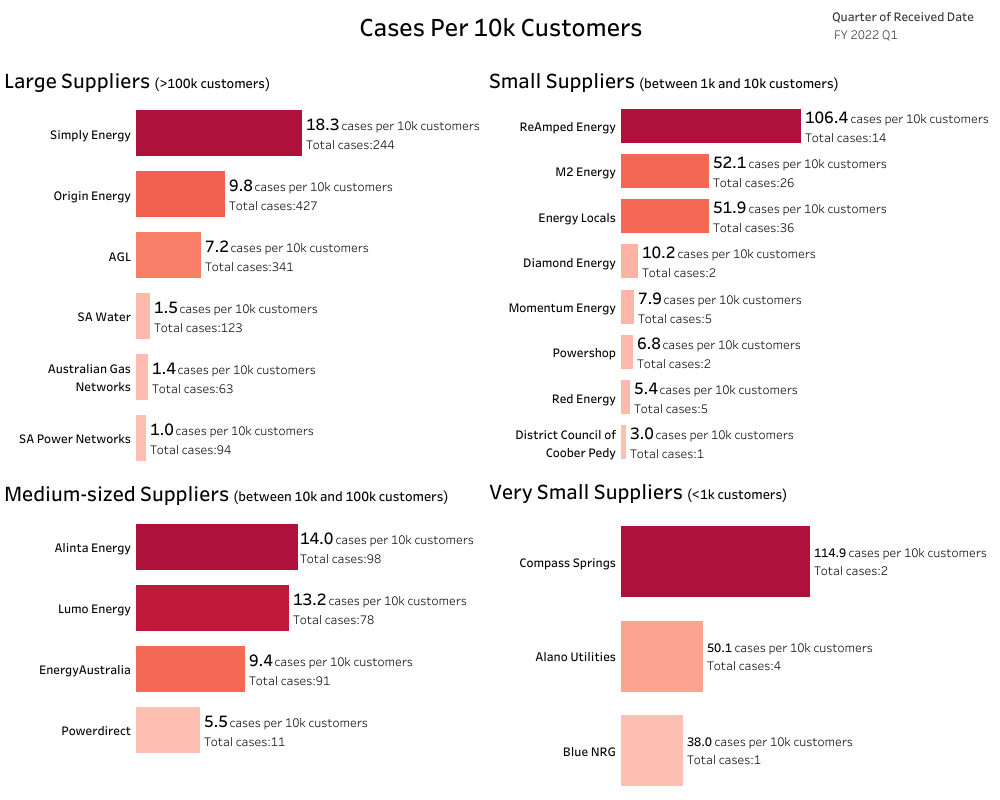
The number of cases per 10,000 customers for each supplier is calculated by dividing the number of cases received during the quarter by the total number of customers for each supplier, multiplied by 10,000. Large Suppliers are those with over 100,000 customers, Medium-sized Suppliers have between 10,000 and 100,000 customers, Small Suppliers have between 1,000 and 10,000 customers and Very Small Suppliers have less than 1,000 customers. The total number of cases is also presented for context.
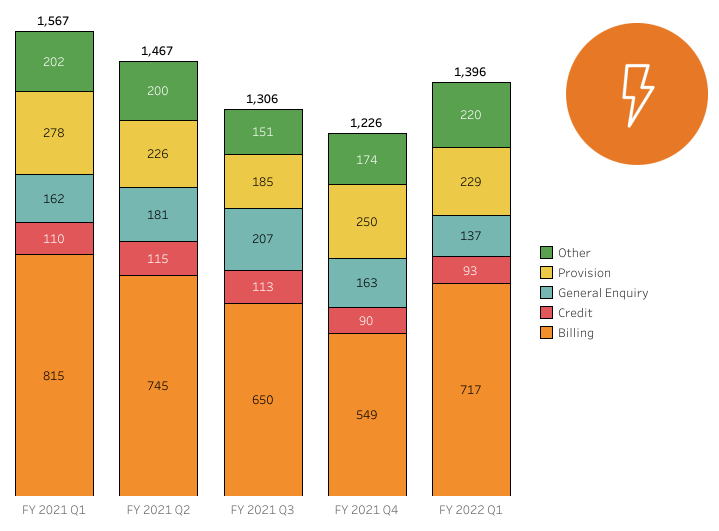
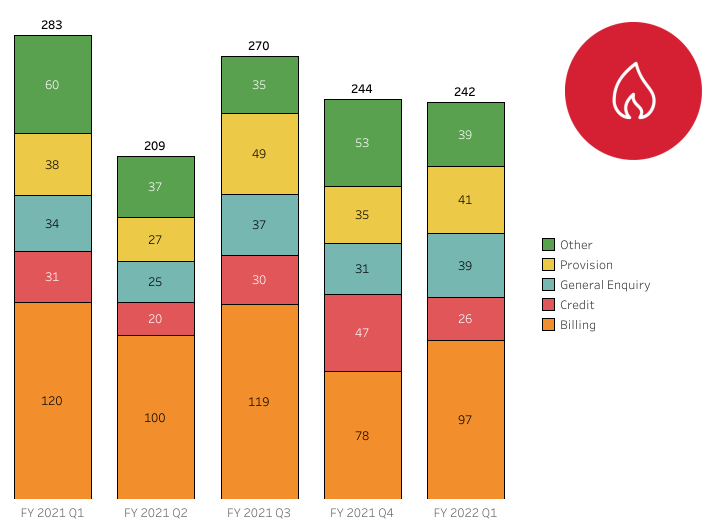
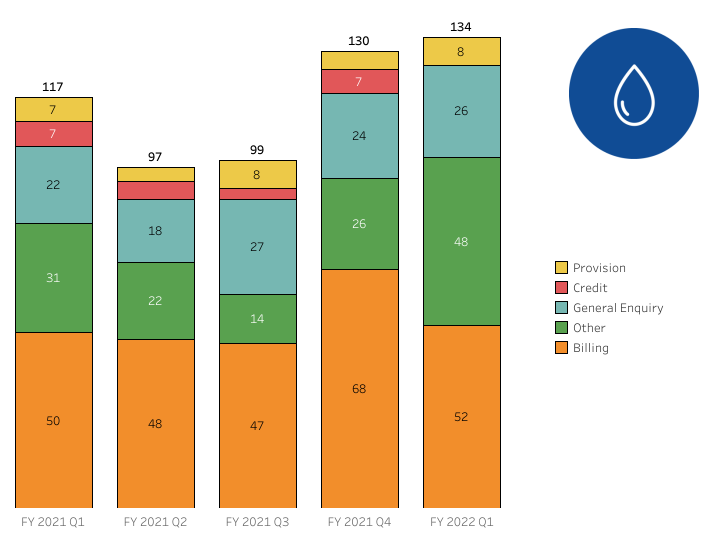
Remember, we are here to help
EWOSA facilitates the prompt resolution of complaints and disputes between consumers of electricity, gas and water services and Members of the Scheme by providing a service to consumers which is free, independent, accessible, fair and informal.
Freecall 1800 665 565
SMS 0488 854 555